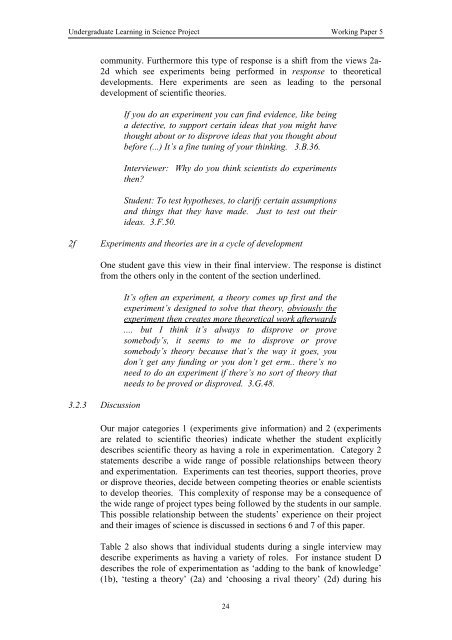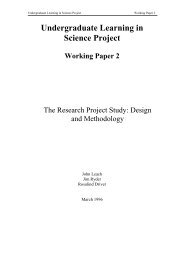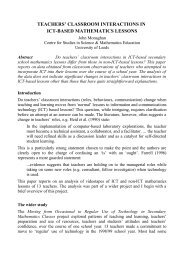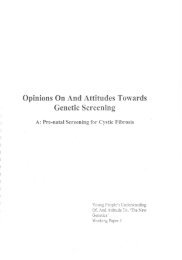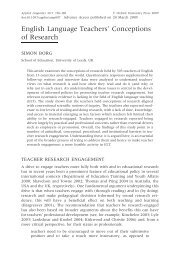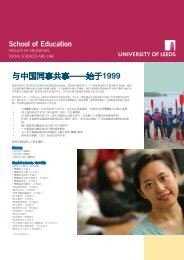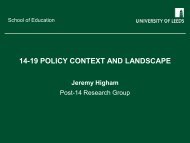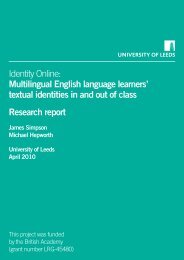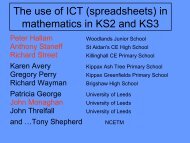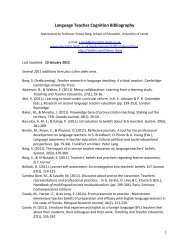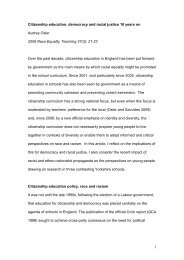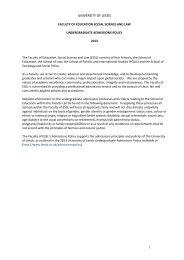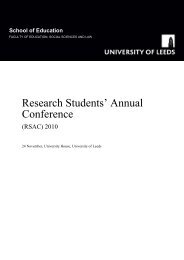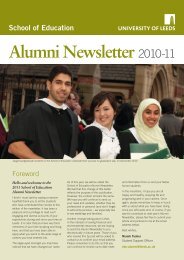Undergraduate science research projects and students - School of ...
Undergraduate science research projects and students - School of ...
Undergraduate science research projects and students - School of ...
You also want an ePaper? Increase the reach of your titles
YUMPU automatically turns print PDFs into web optimized ePapers that Google loves.
<strong>Undergraduate</strong> Learning in Science Project Working Paper 5community. Furthermore this type <strong>of</strong> response is a shift from the views 2a-2d which see experiments being performed in response to theoreticaldevelopments. Here experiments are seen as leading to the personaldevelopment <strong>of</strong> scientific theories.If you do an experiment you can find evidence, like beinga detective, to support certain ideas that you might havethought about or to disprove ideas that you thought aboutbefore (...) It’s a fine tuning <strong>of</strong> your thinking. 3.B.36.Interviewer: Why do you think scientists do experimentsthen?Student: To test hypotheses, to clarify certain assumptions<strong>and</strong> things that they have made. Just to test out theirideas. 3.F.50.2fExperiments <strong>and</strong> theories are in a cycle <strong>of</strong> developmentOne student gave this view in their final interview. The response is distinctfrom the others only in the content <strong>of</strong> the section underlined.3.2.3 DiscussionIt’s <strong>of</strong>ten an experiment, a theory comes up first <strong>and</strong> theexperiment’s designed to solve that theory, obviously theexperiment then creates more theoretical work afterwards.... but I think it’s always to disprove or provesomebody’s, it seems to me to disprove or provesomebody’s theory because that’s the way it goes, youdon’t get any funding or you don’t get erm.. there’s noneed to do an experiment if there’s no sort <strong>of</strong> theory thatneeds to be proved or disproved. 3.G.48.Our major categories 1 (experiments give information) <strong>and</strong> 2 (experimentsare related to scientific theories) indicate whether the student explicitlydescribes scientific theory as having a role in experimentation. Category 2statements describe a wide range <strong>of</strong> possible relationships between theory<strong>and</strong> experimentation. Experiments can test theories, support theories, proveor disprove theories, decide between competing theories or enable scientiststo develop theories. This complexity <strong>of</strong> response may be a consequence <strong>of</strong>the wide range <strong>of</strong> project types being followed by the <strong>students</strong> in our sample.This possible relationship between the <strong>students</strong>’ experience on their project<strong>and</strong> their images <strong>of</strong> <strong>science</strong> is discussed in sections 6 <strong>and</strong> 7 <strong>of</strong> this paper.Table 2 also shows that individual <strong>students</strong> during a single interview maydescribe experiments as having a variety <strong>of</strong> roles. For instance student Ddescribes the role <strong>of</strong> experimentation as ‘adding to the bank <strong>of</strong> knowledge’(1b), ‘testing a theory’ (2a) <strong>and</strong> ‘choosing a rival theory’ (2d) during his24


